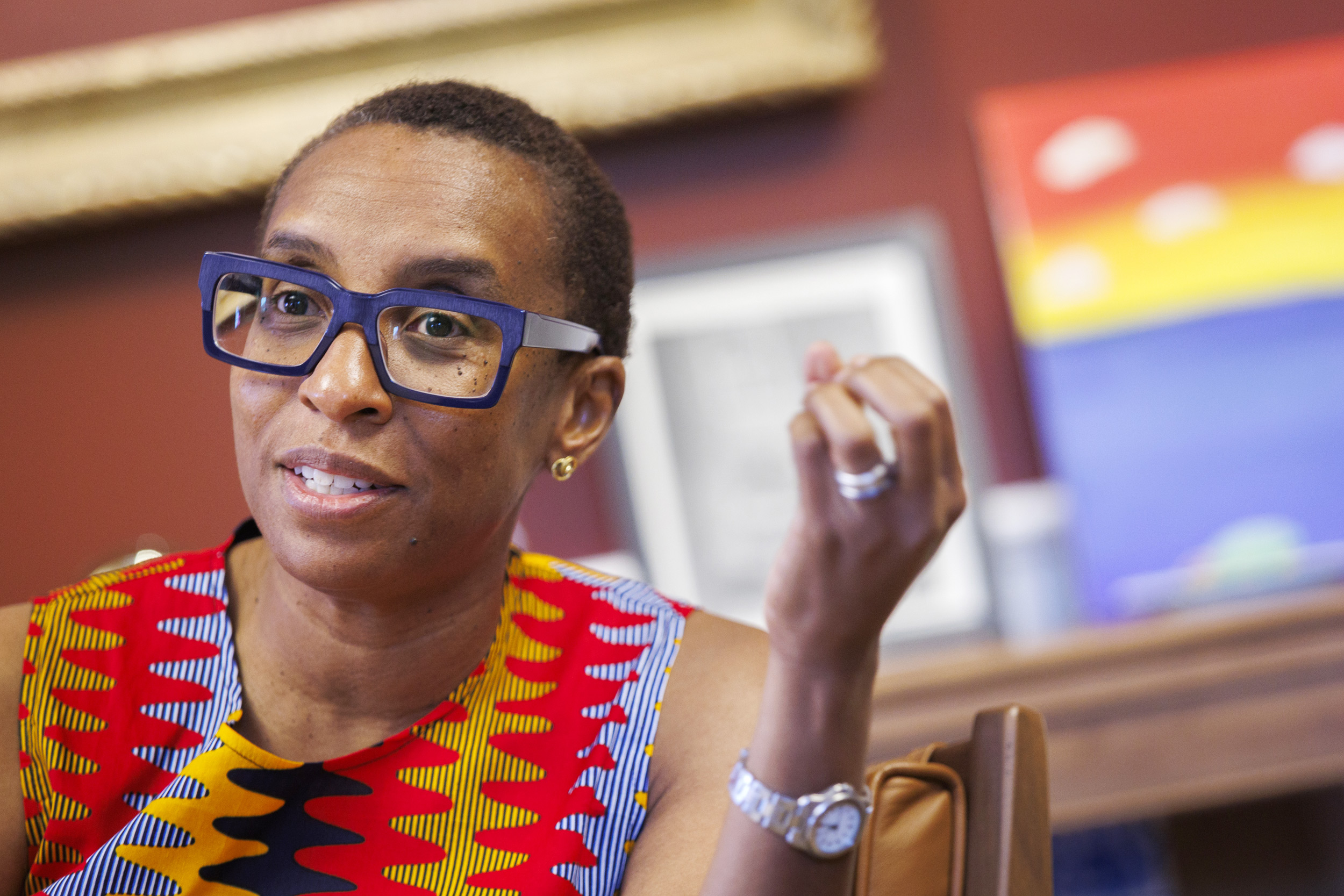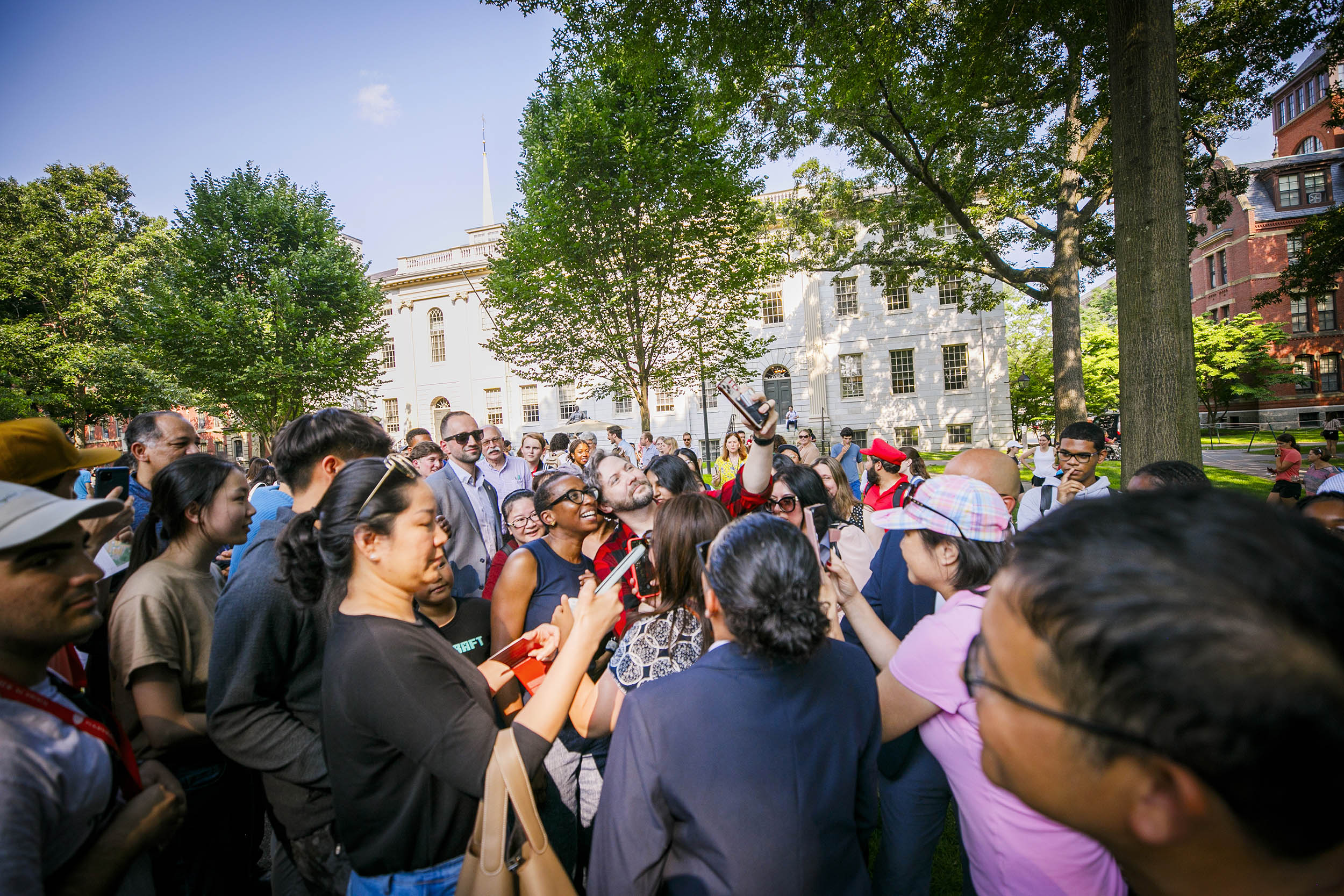Claudine Gay has big plans

Stephanie Mitchell/Harvard Staff Photographer
Harvard’s 30th president welcomes chance to channel ‘awe-inspiring’ ambition of campus community
On Friday, Claudine Gay will be inaugurated as Harvard’s 30th president, poised to seize a “moment of possibility” for the University. Gay, who started in the role July 1, spent the summer building her leadership team, settling into Massachusetts Hall, and connecting with faculty, students, and staff. We talked to her about takeaways from those conversations and her sense of Harvard’s direction in the coming months and years. The interview has been edited for clarity and length.
Q&A
Claudine Gay
GAZETTE: Tell me about your first few months as president. Have there been many surprises?
GAY: There probably hasn’t been a week in my entire Harvard career that hasn’t had at least one surprise, and the last few months have been no different.
The good news is that most have been very positive surprises, including the warm welcome that I’ve received from the community. And, as I’ve begun having conversations with members of the community, I’ve been really struck by the ambition of this place. That was something I knew from my prior roles at Harvard, but learning all the ways that that ambition exists across the University has been awe-inspiring. One highlight was spending half a day at the Law School immersing myself in the community there. I was able to sit in on the property class for the 1Ls. The professor, Molly Brady, is a marvelous teacher. Lucky students. Beyond that, I’m trying to settle in and build my team.
GAZETTE: From a personal standpoint, has your day changed a lot?
GAY: I am a creature of habit and there are certain routines that I will never give up, including exercising every day. My son sometimes still lets me pack his lunch — though he usually would rather go to Raising Cane’s or Chipotle. So, my life is definitely busier, but some of the basic structure that I lean on to keep my life on the rails remains.
GAZETTE: Does the exercise help keep you grounded?
GAY: It definitely helps mentally: being able to focus on something that is not work and knowing you’re doing something good for yourself. That’s very satisfying. And the weather is still so pleasant out, it’s nice to be able to go outside to run. It is an important part of my life.
GAZETTE: You did a lot of outreach over the summer. To name just two examples, you met with members of the community at ice cream socials and joined with colleagues to help students and families on move-in day. How important are these direct connections?
GAY: I think they’re really important. They’re certainly important for me, because I learn a lot by being able to connect, human-to-human, with people. I also believe that they’re important for the community, which wants to understand who is leading them.
The ice cream socials were terrific. I got to meet a lot of people on three very different parts of our campus. But it was summertime and many people were away, so it’s been nice to reconnect with larger groups since the semester has gotten underway.

Claudine Gay met with the community earlier this year at a series of ice cream socials.
File photo by Stephanie Mitchell/Harvard Staff Photographer
I mentioned the time that I spent over at the Law School, and I also spent some time at the Divinity School. I was really pleased to be invited to be one of their speakers at Convocation. And, as you mentioned, I spent lots of time lifting boxes at move-in, though it was all the light ones. I always asked, “Is this the pillows box? I got that one.”
I also had an opportunity to drop in at [a Harvard University Health Services] all-staff gathering to say thank-you — on behalf of myself and the rest of the community — for all they do to keep us whole and healthy. That’s going to continue. We’re only a couple of weeks in and it’s a big campus. I’m going to try to make it to as many quarters of it over the next year as I can, learning as I go.
GAZETTE: Your scholarship has focused on the governed and how they’re affected by leadership. What lessons has that work offered you in your own leadership roles?
GAY: The biggest takeaway from my own research is just how important it is for people to feel seen and heard. Even when they disagree, it is critically important for their values, interests, and preferences to be recognized by leadership and integrated into the thinking of leaders. That’s probably the biggest thing. That’s one of the reasons my starting point in any decision-making process involves trying to understand the perspectives of the various stakeholders around an issue. I do that not with the expectation that I can satisfy everyone, but with an understanding that those perspectives need to be part of the consideration I bring to any issue.
I’ve done a lot of work looking at elected officials — in particular, members of Congress. Those who eventually are voted out of office are often ones who at some point stopped listening to their constituencies. They failed to recognize how their constituencies had evolved over time and were complacent about their command of a district and their electoral security. It’s not completely comparable to my role, but it’s a perennial need for any leader to constantly be listening. It keeps your thinking current and fresh and relevant, and it helps you detect those moments when a shift is happening in the thinking around the issue or in the electorate’s mood.
GAZETTE: Are there specific qualities that you look for when you build a leadership team?
GAY: There are three things that I always look for. I look for a commitment to excellence, because that’s what it means to be at Harvard. I look for commitment to collaboration, because I believe that no one has a monopoly on insight — even if it’s in your area and you are an expert. And I look for commitment to the mission, because that’s why we’re all here.
I expect that from any member of a team that I lead and collaborate with. From there, we get to the unique requirements of a position and the unique contributions or assets that an individual might bring to the role.
GAZETTE: When your appointment was announced, you said, “We enter a moment of possibility.” What are the significant areas of possibility and opportunity for Harvard?
GAY: I talked about the opportunity for Harvard to be more connected to the world by centering the most pressing challenges that the world faces as University priorities. For me, those include democracy and all the ways in which democracy is faltering around the globe, the climate crisis, and inequality, to name a few. Harvard has a lot to bring to the table for society’s urgent priorities. There are also “frontier” opportunities that Harvard is uniquely positioned to exploit. Those exist particularly in the life sciences, by virtue of our core strengths in the FAS, at Longwood, at the Medical School, and the Chan School. In addition, we are embedded in an incredible ecosystem — without peer, I believe — in terms of its aggregation of life sciences expertise: at Harvard, at MIT, at the hospitals, in biotech — the list goes on. For the core challenges around human health, if the answers are going to emerge anywhere, my bet is that they’re going to emerge here.
GAZETTE: In talking about possibilities for the future, is there one you’re personally excited about?
GAY: Betraying my bias as a political scientist, I’m really excited about what we can do around democracy. We’re at a moment where it’s important for those of us who are champions of democracy to help the world understand how to make democracies work: How democratic governance and democratic practices can actually — if well done — solve crises and solve people’s problems.
We have rising inequality, a planet that’s warming — the list goes on. To the extent that we can provide a blueprint for how democratic governance can work more effectively, it would be a huge service to the world and to individual citizens who want to see their democratic governments actually solving their problems. I believe that a place like Harvard has a lot that we can bring to that conversation because we’ve got faculty and practitioners around the University who are engaged on this issue.
GAZETTE: With the Salata Institute for Climate and Sustainability entering its first full year, a study on teaching climate change in hand, and what appears to be a widespread commitment to address this global challenge head-on, what’s next for Harvard? Are we doing enough?
GAY: As long as climate change remains a problem that threatens the future of our society and our planet, nobody is doing enough. That said, Harvard has made strides in recent years to center climate change as a major theme throughout the institution, working to better match its prioritization at Harvard with the scale of the problem. The Salata Institute is a major part of that effort, as is the implementation of the recent report on teaching climate change at Harvard. But ultimately, Harvard’s impact on the problem will come down to the individual efforts of its talented and energized faculty and researchers — some of whom have been working on this problem for decades — and its students, who will inherit the problem and on whom a significant burden of its solution will fall.
GAZETTE: What about major institutional challenges facing the University?
GAY: The challenges, of course, are not unique to Harvard. At the top of the list, I’d put declining trust in higher education and fewer people understanding the value of higher education for both individuals and society. That’s an existential challenge for us as an institution. The silver lining is that there are many potential partners as we make the case for why what we do matters and how it contributes to making the world a better place and enables all of us to thrive.
Some of the other issues facing higher education — and Harvard — are derivative of that lack of trust in higher education, in our institutions, and in our mission. A lack of more robust funding for scientific research, for example, is derivative of the fact that public understanding of the value of higher education has eroded over time.
GAZETTE: Is this an outgrowth of this particular political moment or have we not done a good enough job selling ourselves?
GAY: The political polarization doesn’t help, but it is striking that the erosion in public trust is bipartisan. That should be telling us something, that there’s a broad-based questioning of the value of higher education. Yes, there are some elements that are being inflected by partisan politics, but this is pretty widespread.
GAZETTE: Harvard, at least, has taken some steps to address it, with financial aid rising, as well as student diversity.
GAY: Exactly, and part of it is that we need to get our story out there. There’s a lot of discourse around the challenge of college affordability, for example, but that happens to not be a challenge at Harvard because we make Harvard College a possibility for any talented student that we admit. But we’re still caught up in that unaffordability narrative, in part because what we do is not well known or understood. We are doing the work and we need to make that work more visible, but there are still choices we can make that we haven’t yet made. There are opportunities for us to expand our mission so that it is more responsive to what the world needs from Harvard right now.







